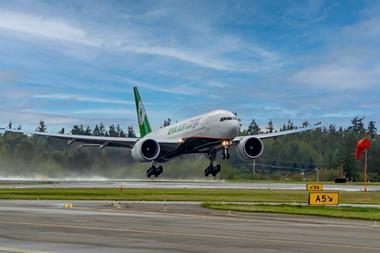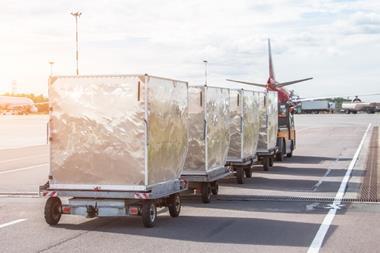In its latest air cargo analysis, IATA has drawn attention to the capacity crunch — a knock-on effect of the coronavirus pandemic — and it has urged governments to "cut the red tape" when it comes to measures being taken to reduce the capacity shortfall.
Alexandre de Juniac, IATA’s director general and chief executive, explained: “At present, we don’t have enough capacity to meet the remaining demand for air cargo.
"Volumes fell by over 15% in March compared to the previous year, but capacity plummeted by almost 23%. The gap must be addressed quickly because vital supplies must get to where they are needed most.
"With most of the passenger fleet sitting idle, airlines are doing their best to meet demand by adding freighter services, including adapting passenger aircraft to all-cargo activity. But mounting these special operations continues to face bureaucratic hurdles."
IATA urged governments to: cut the paperwork for charter operations; exempt cargo crew from quarantine rules that apply to general populations; and ensure there are adequate staff and facilities to process cargo efficiently.
"Governments must cut the red tape needed to approve special flights and ensure safe and efficient facilitation of crew," de Juniac said.
IATA reported that global airfreight demand, measured in cargo tonne km, fell by 15.2% in March compared with the previous year. Meanwhile, global capacity, measured in available cargo tonne km, declined by 22.7% year on year in March.
"The impact of Covid-19 on global air cargo volumes became significantly more pronounced in March," IATA said.
"The outbreak continued to put stress on global supply chains as border restrictions, company closures and interruptions in transportation networks caused delays," it added.
Regionally, airlines based in Africa were the least affected by disruptions in March, compared with other regions. They saw a year-on-year decline of 2.1% and a capacity decline of 10.9%.
Airlines based in the Asia-Pacific region saw demand decrease by 18.3% in March 2020, compared with the same period in 2019. Capacity decreased 30.9%.
North America-based airlines reported a 8.5% year-on-year decline in March and a decrease in capacity of 10.8%.
Europe-based carriers reported an 18.5% year-on-year slide in volumes in March and a demand in capacity by 27.2%. IATA suggested that this was due to "widespread shutdowns in the manufacturing sector across the region".
Growth turned to decline for Middle East-based carriers, which reported a decline of 14.1% year on year following growth of 4.3% in February. Capacity declined by 20.6%.
Latin America-based airlines experienced an 18.5% year-on-year decline in demand and a capacity decrease of 31.2%.
Looking at the prospects for the rest of 2020, IATA suggested that recovery will be slow.
"The optimistic scenario is for a 13% fall in trade in 2020, while the pessimistic scenario sees a 32% fall in trade in 2020," IATA explained. "This will deeply impact air cargo’s prospects."
However, on a more positive note, IATA added: "One area of demand is growing sharply. Pharmaceutical shipments are tracking at double previous-year volumes. This excludes shipments of medical equipment."
De Juniac concluded: "The recession will likely hit air cargo at least as severely as it does the rest of the economy.
"To keep the supply chain moving to meet what demand might exist, airlines must be financially viable. The need for financial relief for airlines by whatever means possible remains urgent."










